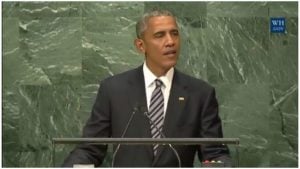Tomorrow, Barack Obama will deliver his last address to the United Nations as president. What will he say? What should he say?
He is likely to touch on a range of global issues, including climate change. I hope he will find some time to focus on security issues, in particular nuclear weapons.

President Obama addressing the UN General Assembly on September 20, 2016
In past years, Obama has generally not used his UN speech to announce major new initiatives or bold policies. Last year, for example, he limited his new ideas to brief mentions of an increase in UN peacekeeping forces and more U.S. aid for Syrian refugees. He also cited the Iran nuclear deal, problems in Syria and with Russia, and the benefits of democracy. Two years ago, he highlighted a new UN Security Council resolution on the responsibility of countries to counter violent extremism and called on leaders to be prepared the following year to announce the “concrete steps” they have taken toward that goal. But there were no major new projects or concrete steps the president announced on any issue.
This year it also seems unlikely that he will announce any major initiatives. So what will the president say about nuclear weapons issues?
On the positive side, he likely will again laud the success of the Joint Comprehensive Plan of Action (JCPOA), the international agreement that imposed significant constraints on Iran’s nuclear
program, halting its rapidly expanding fissile material enrichment capability and putting in place a robust inspection regime. He will likely also note the successes (albeit modest) of his Nuclear Security Summits, designed to eliminate and lock down nuclear weapons-usable materials used for civil purposes around the world. The last summit took place earlier this year in Washington.
On the negative side, he will certainly decry the rapid advance of North Korea’s nuclear program, which conducted not one but two nuclear tests this year along with a number of missile tests. He also may chide Russia for not returning to the negotiating table to pursue further cuts in both countries’ nuclear stockpiles, among other issues.
The only “news” in the speech will be to note the likely passage on Wednesday of a UN Security Council non-binding resolution stating that a nuclear weapons test would defeat the object and purpose of the Comprehensive Nuclear Test Ban Treaty (CTBT). Given it cannot get the treaty through the Senate, the Obama administration is pursuing this UN effort as a way to reinforce the international consensus against testing and support the moratorium on testing that every country but North Korea has observed for nearly 20 years.
Unfortunately, even this relatively modest effort has garnered clamorous opposition in the Senate from Republicans, who claim the initiative would undermine their prerogative to provide advice and consent on all international treaties. The administration has offered assurances that the UN resolution would not impose a legally binding prohibition on testing and thus would not serve as an end run.
That is probably it in terms of policy changes in Obama’s speech. Any major pronouncements on nuclear weapons issues are highly unlikely. In particular, he will not declare that the United States will not be the first nation to use nuclear weapons in any conflict. As widely reported, the administration was considering that option as well as a range of other significant nuclear policy steps the president could take in his final months in office to reduce the nuclear threat.
The fact that the president is now considering major changes late in his final term is somewhat surprising, given where his administration started from and what has happened since.
President Obama’s first foreign policy address was in Prague in April 2009. In an agenda-setting speech, he stated “clearly and with conviction America’s commitment to seek the peace and security of a world without nuclear weapons.” He noted “as the only nuclear power to have used a nuclear weapon, the United States has a moral responsibility to act.” He added, “[t]o put an end to Cold War thinking, we will reduce the role of nuclear weapons in our national security strategy, and urge others to do the same.” He sought a new treaty with Russia to reduce both countries’ nuclear stockpiles, and U.S. ratification of the CTBT.
Seven years later, the changes have not been as dramatic as that first speech heralded. There was an arms control agreement with Russia: New START, which will make modest cuts in U.S. and Russian nuclear stockpiles. But a hoped-for second round of cuts never got off the ground. Based on an assessment that the odds of ratification were too long, the administration invested only modest energy on the CTBT, which the Senate had already rejected once back in 1999. And while there were some reductions in the role of nuclear weapons in U.S security policy, the president concluded in an op-ed in the Washington Post, “I’m the first to acknowledge that we still have unfinished business.”
With that in mind, what should he say in his farewell UN address? How should he cement his legacy, earn the Nobel Peace Prize even he admits was given more for promise than achievement, and make the world a safer place?
He should announce that he will: (1) remove U.S. land-based missiles from hair-trigger alert; (2) cut deployed U.S. nuclear forces to 1,000 warheads, as he has already concluded he could safely do; and (3) cancel the proposed new nuclear-armed cruise missile. And he should declare that the sole purpose of U.S. nuclear weapons is to deter a nuclear attack on the United States or its allies.
As I lamented above, it’s unlikely that he will announce any of these things. But he should. Because, in the final analysis, it is clear that nuclear weapons are no longer in the best U.S. security interest. They are an unparalleled, game-changing liability, not a life-saving asset. Indeed, the only threat to the survival of the United States is a nuclear attack. Doing whatever he can do to reduce the threat from nuclear weapons is in President Obama’s interest, and in the interest of every American.
